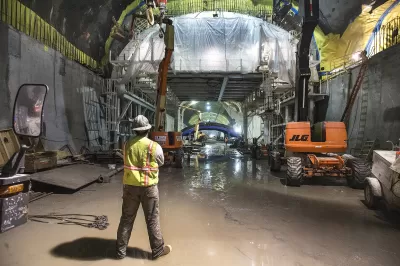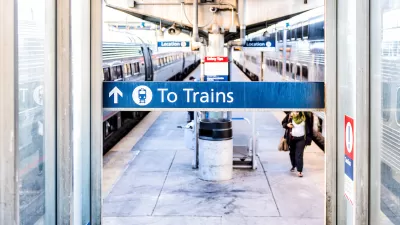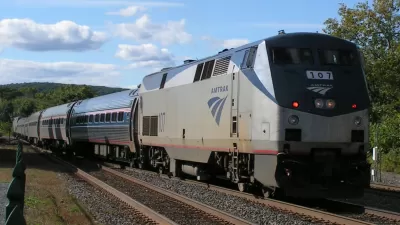Most major infrastructure projects fail to meet projected timelines or budgets. Some experts say this is a structural flaw built into "systematically deceptive" estimate practices.

California's High-Speed Rail. New York's East Side Access extension. Honolulu's light rail line. Ralph Vartabedian describes some of the infrastructure megaprojects that have run up against "cost overruns, engineering challenges and political obstacles that have made it all but impossible to complete a major, multibillion-dollar infrastructure project in the United States on budget and on schedule over the past decade." These persistent delays and cost overruns, writes Vartabedian, make it seem unlikely that the $1.2 trillion in new infrastructure promised by the Build Back Better bill will be completed anytime soon.
The $1.2 trillion package has bold goals, directing the majority of $500 billion to highways, $39 billion to urban transit, $65 billion to broadband projects and $73 billion to electrical grids, among other items. The nation’s busiest passenger rail line, Amtrak’s Boston-to-Washington corridor, would get the biggest slice of a $66 billion rail package. The infrastructure spending plan is unlikely to rescue some existing infrastructure projects that are bogged down with problems.
The ambitious timetable is hindered by sharply rising materials costs, shortages of skilled labor, and other supply chain factors, says Vartabedian. And this isn't a problem unique to the U.S.: an Oxford study of dozens of international projects found that 92 percent of them went over time and budget, pointing to "systematically and significantly deceptive" cost estimates.
In fact, experts argue that budget and time estimates are often flawed from the start. Former San Francisco mayor Willie Brown said the quiet part out loud in a 2013 newspaper column, calling the first budget for infrastructure projects "a down payment": "If people knew the real cost from the start, nothing would ever be approved. The idea is to get going."
FULL STORY: Years of Delays, Billions in Overruns: The Dismal History of Big Infrastructure

Alabama: Trump Terminates Settlements for Black Communities Harmed By Raw Sewage
Trump deemed the landmark civil rights agreement “illegal DEI and environmental justice policy.”

Study: Maui’s Plan to Convert Vacation Rentals to Long-Term Housing Could Cause Nearly $1 Billion Economic Loss
The plan would reduce visitor accommodation by 25% resulting in 1,900 jobs lost.

Planetizen Federal Action Tracker
A weekly monitor of how Trump’s orders and actions are impacting planners and planning in America.

This Toronto Suburb Has More Bus Riders Than Columbus, Ohio
Brampton, Ontario used gradual improvements in service to prove that if you build it, they will ride.

Paris Bike Boom Leads to Steep Drop in Air Pollution
The French city’s air quality has improved dramatically in the past 20 years, coinciding with a growth in cycling.

Why Housing Costs More to Build in California Than in Texas
Hard costs like labor and materials combined with ‘soft’ costs such as permitting make building in the San Francisco Bay Area almost three times as costly as in Texas cities.
Urban Design for Planners 1: Software Tools
This six-course series explores essential urban design concepts using open source software and equips planners with the tools they need to participate fully in the urban design process.
Planning for Universal Design
Learn the tools for implementing Universal Design in planning regulations.
Smith Gee Studio
Alamo Area Metropolitan Planning Organization
City of Santa Clarita
Institute for Housing and Urban Development Studies (IHS)
City of Grandview
Harvard GSD Executive Education
Toledo-Lucas County Plan Commissions
Salt Lake City
NYU Wagner Graduate School of Public Service





























